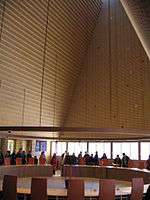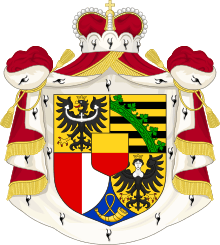Landtag of Liechtenstein
| Landtag of the Principality of Liechtenstein Landtag des Fürstentums Liechtenstein | |
|---|---|
 | |
| Type | |
| Type | |
| Leadership | |
| Structure | |
| Seats | 25 councillors |
 | |
Political groups |
Government (17) Opposition (8)
|
| Authority | Chapter V, Constitution of Liechtenstein |
| Elections | |
| Open list proportional representation elected in two constituencies, each with a separate 8% election threshold | |
Last election | 5 February 2017 |
| Meeting place | |
 | |
|
Peter-Kaiser-Platz 3 LI-9490 Vaduz | |
| Website | |
|
www | |
 |
|---|
| This article is part of a series on the politics and government of Liechtenstein |
The Landtag of the Principality of Liechtenstein (German: Landtag des Fürstentums Liechtenstein), commonly referred to as the Landtag of Liechtenstein (German: Liechtensteinischer Landtag), is the legislative branch of the government of Liechtenstein. It has 25 members, elected for a four-year term by open list proportional representation from two constituencies, Oberland with 15 seats and Unterland with 10 seats. The electoral threshold is 8%.
Unterland consists of Eschen, Gamprin, Mauren, Ruggell and Schellenberg; Oberland consists of Balzers, Planken, Schaan, Triesen, Triesenberg and Vaduz.
The current President of the Landtag (Speaker) is Albert Frick, who has held the post since 2013 and the current Vice-President is Gunilla Marxer-Kranz, who assumed the post in 2017.[1]
Last election
| Party | Votes | % | +/– | Seats | +/– |
|---|---|---|---|---|---|
| Progressive Citizens' Party | 68,673 | 35.2 | -4.8 | 9 | –1 |
| Patriotic Union | 65,742 | 33.7 | +0.2 | 8 | 0 |
| The Independents | 35,885 | 18.4 | +3.1 | 5 | +1 |
| Free List | 24,595 | 12.6 | +1.5 | 3 | 0 |
| Total | 194,895 | 100 | — | 25 | 0 |
| Valid votes | 14,763 | 95.8 | |||
| Invalid/blank votes | 645 | 4.2 | |||
| Total | 15,408 | 100 | |||
| Registered voters/turnout | 19,806 | 77.8 | |||
| Source: Landstagwahlen | |||||
References
- ↑ "Marxer-Kranz Gunilla". Landtag of Liechtenstein. Retrieved 4 November 2017.
See also
External links
